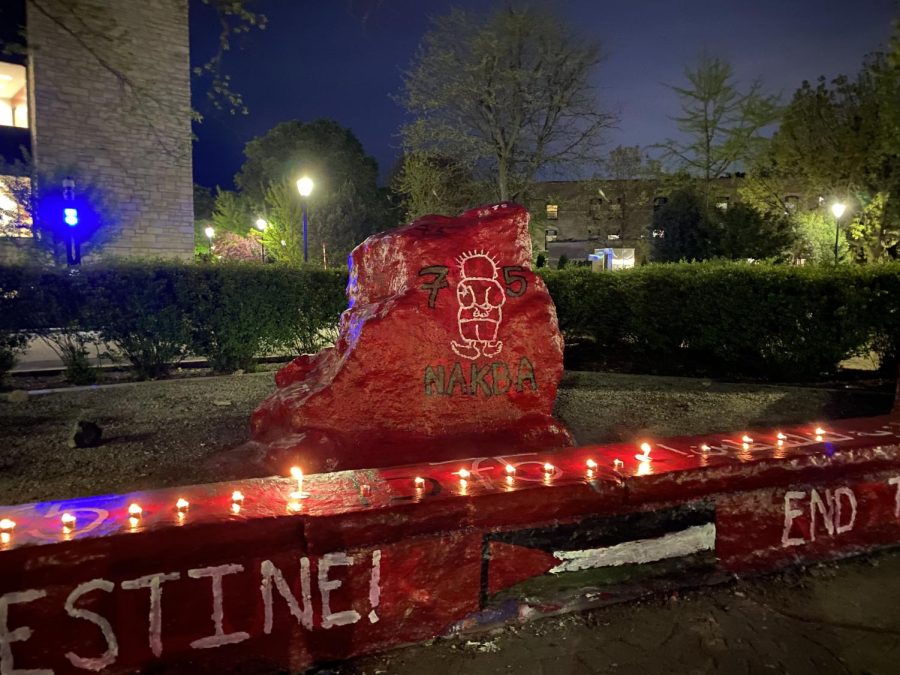SJP vigil commemorates 75th anniversary of the Nakba, centers empowerment and resistance
Joanna Hou/Daily Senior Staffer
The Rock. Students for Justice in Palestine painted it to commemorate Nakba Day before holding a vigil Monday night.
May 16, 2023
Content warning: This article contains mentions of death.
More than 700,000 Palestinians faced displacement around 1948, during that year’s Arab-Israeli war following the end of the British mandate over the region. Villages were destroyed and many were forced to flee from their homes. Thousands more were murdered in massacres.
Seventy-five years later, Palestinians continue to remember the Nakba, which loosely translates to “catastrophe” in English. Nakba Day, which takes place every year on May 15, commemorates the ongoing displacement of these refugees and their descendants.
About 50 students gathered in a circle at The Rock to commemorate Nakba Day at a vigil hosted by Students for Justice in Palestine on Monday evening. Attendees held candles as SJP member and Weinberg junior Muhammad Saleh, who helped organize the vigil, spoke about the importance of remembrance and resistance when looking back on the Nakba.
“The atrocities committed during the Nakba are a testament to the horrors of colonization and the ongoing oppression faced by the Palestinian people,” he said. “We must remember that the Nakba was only the beginning. Today also marks 75 years of occupation, 75 years of dehumanization, 75 years of apartheid and 75 years of ethnic cleansing.”
The vigil concluded with a moment of silence, giving attendees a chance to offer prayers or reflections.
SJP member and Weinberg freshman Jannah Issa said she sees and feels the lasting impacts of the Nakba in her own life. Her family in Palestine has been “pushed to certain places” and she said she cannot go into most holy sites in Israel and Palestine due to her Palestinian ethnicity.
Issa said she was happy to see the solidarity in the crowd because activism can at times feel isolating or lonely. A large part of Palestinian resistance is about letting one’s presence be known, she said, and it is meaningful to have community support both inside and outside of SJP.
“(Resistance is about) making it known that you’re here and you’re not going to stop fighting … being stubborn, staying where you are and always pushing back and no matter how hard they push you.” Issa said. “A lot of Palestinians keep their keys for their old homes. No matter what happens to them, one day they hope to return back home.”
Saleh echoed some of Issa’s sentiments. Coming to Northwestern, he said, he did not expect to meet many other Palestinian students. Meeting both Palestinian and non-Palestinian students who supported his community made him feel like he belonged.
He said Nakba survivors should not be forgotten because their descendants still suffer today. Because these refugees refused to accept the injustices happening to them, Saleh said, they paved the way for ongoing resistance. To him, speaking out is one of the most powerful forms of resistance.
“When we talk about Palestine, we don’t like to simply use victimization terms,” Saleh said. “We like to humanize them by empowering them, showing them what they’re capable of against these supposedly higher authorities that are oppressing them.”
Saleh said the SJP community inspires him to speak out and try to inform others on causes he cares about.
On Tuesday, SJP will host a workshop teaching tatreez, a Palestinian embroidery style. Communication sophomore Rama Darayyad said the art is often displayed on Palestinian clothing or accessories.
“I find this one of my favorite forms of resistance because I’m actually wearing it,” Darayyad said. “It reminds me of my grandma, who, when she was forced to flee from Palestine, would wear her tatreez proudly as a form of resistance.”
Darayyad’s parents were born and raised in Palestine. During the Nakba, her father’s side of the family fled to Jordan, while her mother’s side of the family remained in Jerusalem and still is there today. She said it’s “an everyday struggle to be Palestinian” there.
She said she hopes people will recognize the ongoing occupation of Palestine. The 75th anniversary of the Nakba marks the first time the U.N. has recognized the mass displacement, though 30 countries — including the U.S. — voted against the resolution to adopt the commemoration.
“I want people to realize that my people are not hidden,” Darayyad said. “We have lives, and I’m happy to represent that and persist in resistance.”
Correction: A previous version of this story misstated where Darayyad’s father’s side fled to during the Nakba. The Daily regrets the error.
Email: [email protected]
Twitter: @joannah_11
Related Stories
— Mohammed El-Kurd discusses respectability politics during Arab American Heritage Month
— Community members gather to honor lost Palestinian lives in Students for Justice in Palestine vigil
— SJP organizers petition for schoolwide boycott of Sabra hummus, hang banner on Norris entrance












